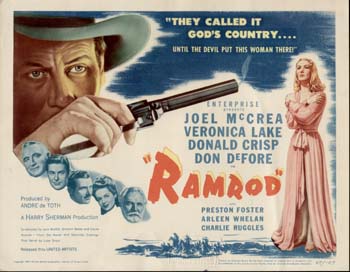 “Westerns are timeless. The soundtracks rarely are.” Lileks tweeted that pithy two-liner a few weeks ago, and I’ve been thinking about it ever since. I love Westerns, but most of them have scores that are inoffensive at best, appallingly banal at worst. The exceptions to the rule are as rare as they’re noteworthy. The other night Mrs. T and I watched André De Toth’s Ramrod, a wonderful little 1947 ranch-war film starring Joel McCrea and Veronica Lake (it wasn’t their first film together, by the way). I confess to not having noticed the music when I first saw Ramrod, but this time around I was startled to discover that it was the work of Adolph Deutsch, a very fine composer who also scored The Maltese Falcon and The Apartment, and I was struck by how much his taut, cliché-free music contributed to the film’s total effect.
“Westerns are timeless. The soundtracks rarely are.” Lileks tweeted that pithy two-liner a few weeks ago, and I’ve been thinking about it ever since. I love Westerns, but most of them have scores that are inoffensive at best, appallingly banal at worst. The exceptions to the rule are as rare as they’re noteworthy. The other night Mrs. T and I watched André De Toth’s Ramrod, a wonderful little 1947 ranch-war film starring Joel McCrea and Veronica Lake (it wasn’t their first film together, by the way). I confess to not having noticed the music when I first saw Ramrod, but this time around I was startled to discover that it was the work of Adolph Deutsch, a very fine composer who also scored The Maltese Falcon and The Apartment, and I was struck by how much his taut, cliché-free music contributed to the film’s total effect.
The next day I remembered that in 2003 I posted a list of my favorite Westerns, one of which is Ramrod. Here are the others, together with the names of the men who scored them:
• Blood on the Moon (1948), directed by Robert Wise and starring Robert Mitchum and Barbara Bel Geddes. The music is by Roy Webb, RKO’s insufficiently appreciated house composer, a specialist in suspense who also scored Cat People, I Walked with a Zombie, Notorious, and Out of the Past. Alas, I can’t recall the music, which is surprising, since I’m a great fan of Webb’s work.
• Canyon Passage (1946), directed by Jacques Tourneur and starring Dana Andrews and Susan Hayward. The uncredited music is by Frank Skinner, a prolific studio hack, and I don’t remember a note of it. Fortunately, the film also features several songs written and sung by Hoagy Carmichael, including the delightful “Ole Buttermilk Sky.”
• Four Faces West (1948), directed by Alfred E. Green and starring Joel McCrea. I’ve seen it four times and still can’t tell you anything about the score, which was written by Paul Sawtell, another forgotten studio journeyman who churned out functional background music by the yard. (This, by the way, is the only Hollywood Western in which not a single shot is fired.)
• Hondo (1953), directed by John Farrow and starring John Wayne and Geraldine Page. Part of the score is by Hugo Friedhofer, who wrote the masterful music for The Best Years of Our Lives, and the rest is by Lionel Newman, Alfred’s brother, who was better known as a studio conductor. It isn’t hard to tell who wrote what: Friedhofer’s work is original and incisive, Newman’s conventional.
• Red River (1948), directed by Howard Hawks and starring John Wayne and Montgomery Clift. Dimitri Tiomkin scored this one in his usual Tchaikovsky-goes-West manner. Not my thing, to put it mildly, but at least it doesn’t get in the way.
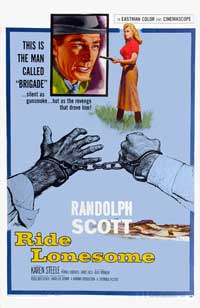 • Ride Lonesome (1959), directed by Budd Boetticher and starring Randolph Scott and Pernell Roberts. Heinz Roemheld’s score is a repetitious string of clippity-cloppety clichés. It’s a tribute to the film’s dramatic force that the trite music doesn’t sink it. (The only Boetticher-Scott film with good music is Seven Men from Now, which was scored by Henry Vars.)
• Ride Lonesome (1959), directed by Budd Boetticher and starring Randolph Scott and Pernell Roberts. Heinz Roemheld’s score is a repetitious string of clippity-cloppety clichés. It’s a tribute to the film’s dramatic force that the trite music doesn’t sink it. (The only Boetticher-Scott film with good music is Seven Men from Now, which was scored by Henry Vars.)
• Ride the High Country (1962), directed by Sam Peckinpah and starring Joel McCrea and Randolph Scott. The music is by George Bassman, who is best known for writing “Let’s Dance,” Benny Goodman’s theme song. It’s a first-rate piece of work built around a spacious main theme that Bassman ingeniously transforms into the powerful ostinato-based set piece used to accompany the climactic gun battle. A classic of Western film music, though not widely recognized as such.
• Rio Bravo (1959), directed by Howard Hawks and starring John Wayne, Dean Martin, and Angie Dickinson. Another Dimitri Tiomkin score, dramatically effective but musically undistinguished. (Do any of Hawks’ films have memorable background music? I’m coming up blank.)
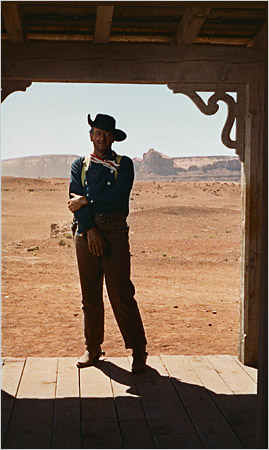 • The Searchers (1956), directed by John Ford and starring John Wayne. Max Steiner, of all people, scored the greatest of all Western films, and though he was more at home with romantic melodrama, his lush, expansive idiom works unexpectedly well here.
• The Searchers (1956), directed by John Ford and starring John Wayne. Max Steiner, of all people, scored the greatest of all Western films, and though he was more at home with romantic melodrama, his lush, expansive idiom works unexpectedly well here.
• Winchester ’73 (1950), directed by Anthony Mann. Did this one even have a score? Walter Scharf supposedly wrote it, but he didn’t get screen credit and it hasn’t stayed with me.
Not a very good batting average, in short, and I can’t think of many other Westerns that have noteworthy scores, though Elmer Bernstein’s The Magnificent Seven, Jerry Fielding’s The Wild Bunch, Bernard Herrmann’s Garden of Evil, and Jerome Moross’s The Big Country are all deserving of enthusiastic mention. For the most part, though, I’d have to say on reflection that Lileks called it: the best Westerns tend as a rule to be far better than their music.
UPDATE: Everybody’s been asking me about Ennio Morricone’s scores for Once Upon a Time in the West and the “spaghetti Westerns” featuring Clint Eastwood. As far as I’m concerned, they’re the inverse of what I was talking about in the above post: Westerns whose music is better than the film it accompanies.

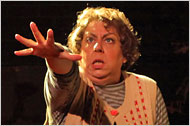 The phrase “cult classic” sets my teeth on edge, but “Coraline,” Neil Gaiman’s deliciously scary 2002 children’s book, is well on the way to qualifying. It’s already been turned into a graphic novel and a 3-D animated feature film, and now “Coraline” has become an Off-Broadway musical whose previews generated so much buzz that the show’s limited run has already been extended for two weeks. Whether the musical version has any future beyond its current run is another matter. I think it does–but only if future productions slice away the obscuring coyness that keeps this exceptionally promising show from living up to its full potential….
The phrase “cult classic” sets my teeth on edge, but “Coraline,” Neil Gaiman’s deliciously scary 2002 children’s book, is well on the way to qualifying. It’s already been turned into a graphic novel and a 3-D animated feature film, and now “Coraline” has become an Off-Broadway musical whose previews generated so much buzz that the show’s limited run has already been extended for two weeks. Whether the musical version has any future beyond its current run is another matter. I think it does–but only if future productions slice away the obscuring coyness that keeps this exceptionally promising show from living up to its full potential….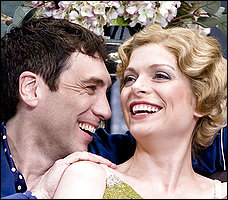 Anyone who saw the Roundabout Theatre Company’s ill-conceived 2001 Broadway revival of “Design for Living” and wondered what the fuss was about should catch the next train to Washington, where all is made satisfyingly manifest by the Shakespeare Theatre Company. “Design for Living” isn’t Noël Coward’s best play, but it’s one of the most original and challenging things he ever wrote, and Michael Kahn, the company’s artistic director, has underlined the play’s essential seriousness without undermining its fizzy humor….
Anyone who saw the Roundabout Theatre Company’s ill-conceived 2001 Broadway revival of “Design for Living” and wondered what the fuss was about should catch the next train to Washington, where all is made satisfyingly manifest by the Shakespeare Theatre Company. “Design for Living” isn’t Noël Coward’s best play, but it’s one of the most original and challenging things he ever wrote, and Michael Kahn, the company’s artistic director, has underlined the play’s essential seriousness without undermining its fizzy humor….